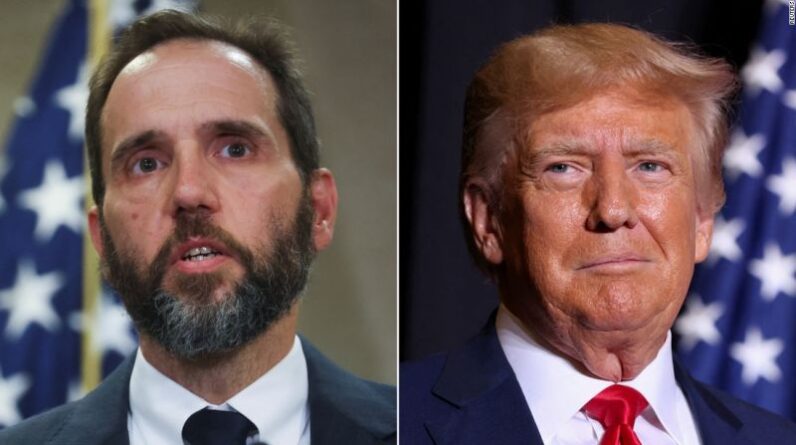
CNN
—
Former President Donald Trump and his co-defendant Walt Nauta on Monday night outlined some of the legal attacks they will potentially launch against charges related to the alleged mishandling of classified information brought against them by special counsel Jack Smith.
The defendants argue that the charges will lead to “unprecedented” pretrial disputes that will require U.S. District Judge Aileen Cannon to intervene on legal issues that have likely never come before a court.
The defense also suggests that it won’t be possible to seat a fair jury while the presidential campaign is underway, a hint that Trump may eventually seek a post-election trial date, although Monday’s filing did not propose a specific timetable.
“This extraordinary case presents a serious challenge to both the fact and the perception of our American democracy,” Trump and Nauta’s legal teams wrote in the joint filing. “The Court now presides over a prosecution advanced by the administration of a sitting president against his main political rival, himself a leading candidate for the presidency of the United States.”
The special counsel wants the case to go to trial by mid-December. Trump and Nauta have pleaded not guilty to the charges, which include allegations related to obstruction in addition to allegations that Trump illegally withheld national defense information.
Here are some of the pre-trial issues that Trump and Nauta may raise in the case:
Trump and his allies have argued that the Presidential Records Act, passed after the Watergate scandal to dictate how a former president is required to hand over his administration’s records upon leaving the White House, actually protects his alleged behavior .
Not surprisingly, his lawyers say they will pursue that argument in a motion to dismiss the case, arguing that these legal issues have “never been addressed by any court.”
Legal experts have thoroughly debunked the claims Trump has made about the PRA so far.
Defendants’ filing says they may raise “constitutional and statutory challenges to the special counsel’s authority to maintain this action (additional issues of first impression to this Court).”
The filing did not explain the extent of those arguments, but when Trump faced an investigation by special counsel Robert Mueller into his campaign’s ties to Russia, he claimed that “the appointment of the special counsel it is totally UNCONSTITUTIONAL!”
When those arguments were brought to court against Mueller’s authority by another entity charged in the Russia investigation, a Trump-appointed judge upheld Mueller’s appointment and judicial powers.
Trump and Nauta say the “classified status of the documents and their alleged impact on national security interests” are a potential pretrial issue that will need to be addressed.
Trump has claimed at times that he declassified the documents in question, though his lawyers have not made those claims in legal filings. The charges brought by Smith, however, do not necessarily address whether the materials were classified.
The defendants anticipated opposition to prosecutors using “any ‘secret’ evidence in a case of this nature.”
This appears to be a reference to procedures to be drawn up, under relevant law, as to how classified materials will be dealt with during the trial and whether they will be shielded from public view. Trump and Nauta say they won’t know how much conflict there will be over those proceedings until they have a chance to review the classified discovery.
But they said they “believe there should simply be no ‘secret’ evidence, no facts hidden from public view concerning the prosecution of a major presidential candidate by his political opponent.”
The first hearing on how to handle the classified documents is scheduled for next Tuesday.
Monday night’s filing offered new insight into the evidence Smith’s team has turned over to the defendants so far, suggesting they will have to make additional discovery requests at some point.
In the first production of discovery alone, which did not include any of the classified material in the case, prosecutors gave the defense roughly nine months of closed-circuit television footage, according to the new document, as well as 428,300 records including 122,650 emails electronic and 305,670 documents.
Without explicitly saying they would seek a post-election trial date, Trump and Nauta floated the idea that it might not even be possible to seat a jury while the presidential campaign is underway.
“There is simply no question here that any trial of this action pending a presidential election will affect both the outcome of that election and, most importantly, the defendants’ ability to obtain a fair trial,” he said. say the presentation
[ad_2]
Source link





